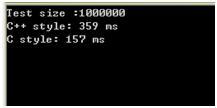fstream与 C 风格(例如fread 和 fwrite )两种读写文件方法的效率比较
?
我觉得作者写的挺好,评论也写的很对。
目前我的项目就是在VS2008+Qt+win7上开发的。我上次总结的QFile和C语言对文件操作的性能比较.--读取double型二进制数据文件也说明了这个问题。
在windows平台下,MSVC编译器的环境下,对大文件的数据读写操作。采用C语言的形式(例如fread?和?fwrite?)确实比C++/QT的串行序列化读写文件,速度快上好几倍。可以参考这两篇文章。
1、QFile和C语言对文件操作的性能比较.--读取double型二进制数据文件
2、fstream与 C 风格(例如fread 和 fwrite )两种读写文件方法的效率比较
?
?
转载:
为了探录c++?风格的fstream与?C?风格(例如fread?和?fwrite?)两种读写文件的方法的效率,我特意做了两个实验。
我的机器是Windows XP, Visual Studio 2008
1.?测试写文件速度
程序设计思路:?将TEST_SIZE个字符用两种方式写入文件,记录两种方式的耗时。?
实验代码:
[cpp]?view plaincopy
- void?test_write()??
- {?????
- ????const?int?TEST_SIZE?=?10000000?;??
- ????const?char*?c_plus_write_file?=?"H://c_plus_write_file.txt";??
- ????const?char*?c_write_file?=?"H://c_write_file.txt";??
- ??????
- ????cout<<"Test?size?:"?<<?TEST_SIZE?<<endl;??
- ????//c++?style?writing?file??
- ????ofstream?of(c_plus_write_file);??
- ????assert(of);??
- ????time_t?start,?end;??
- ????start?=??clock();??
- ????for(int?i=0;?i?<?TEST_SIZE;?++i)??
- ????{??
- ????????char?tmp[1];??
- ????????tmp[0]?=?char(i);??
- ????????of?<<?tmp[0];??
- ????}??
- ????end?=?clock();??
- ????of.close();??
- ????cout<<"C++?style:?"<<end?-?start?<<"?ms"<<endl;??
- ????//c?style?writing?file??
- ????FILE*?fp?=?fopen(c_write_file,?"w");??
- ????start?=??clock();??
- ????for(int?i=0;?i?<?TEST_SIZE;?++i)??
- ????{??
- ????????char?tmp[1];??
- ????????tmp[0]?=?char(i);??
- ????????fwrite(?tmp,?1,?1,?fp);??
- ????}??
- ????end?=?clock();??
- ????fclose(fp);??
- ????cout<<"C?style:?"<<end?-?start?<<"?ms"<<endl;??
- ????cin.get();??
- }??
?
?
实验结果:

图1

图2

图3
?
**从图1、2、3,可以看出, ofstream 的 << 运算符 所耗时 是fwrite()的近三倍
?
?
把of<<的代码改成了: of.write(tmp,1);?后结果:
?
?
实验代码:
[cpp]?view plaincopy- void?test_write()??
- {?????
- ????const?int?TEST_SIZE?=?1000000?;??
- ????const?char*?c_plus_write_file?=?"H://c_plus_write_file.txt";??
- ????const?char*?c_write_file?=?"H://c_write_file.txt";??
- ??????
- ????cout<<"Test?size?:"?<<?TEST_SIZE?<<endl;??
- ????//c++?style?writing?file??
- ????ofstream?of(c_plus_write_file);??
- ????assert(of);??
- ????time_t?start,?end;??
- ????start?=??clock();??
- ????for(int?i=0;?i?<?TEST_SIZE;?++i)??
- ????{??
- ????????char?tmp[1];??
- ????????tmp[0]?=?char(i);??
- ????????of.write(tmp,1);??
- ????}??
- ????end?=?clock();??
- ????of.close();??
- ????cout<<"C++?style:?"<<end?-?start?<<"?ms"<<endl;??
- ????//c?style?writing?file??
- ????FILE*?fp?=?fopen(c_write_file,?"w");??
- ????start?=??clock();??
- ????for(int?i=0;?i?<?TEST_SIZE;?++i)??
- ????{??
- ????????char?tmp[1];??
- ????????tmp[0]?=?char(i);??
- ????????fwrite(?tmp,?1,?1,?fp);??
- ????}??
- ????end?=?clock();??
- ????fclose(fp);??
- ????cout<<"C?style:?"<<end?-?start?<<"?ms"<<endl;??
- ????cin.get();??
- }??
?
实验结果:
?

图4

图5

图6
?
?
对比图4 和 图1、 图5 和 图2、图6 和 图3, 可以看到 ?<< 运算符没有 ofstream.write(), 快, 但两者还是没有 fwrite() 快
?
结论: 效率 ??fwrite() > ?ofstream.operator<<() > ofstream.write()?
?
?
?
?
3. 下面做读文件的比较:
?
程序设计思路: 用两种方法去读一个近100M的文本,记录时间。
?
实验代码:
?
[cpp]?view plaincopy- void?test_read()??
- {?????
- ????const?char*?read_file?=?"H://read4.txt";??
- ????const?int?BUF_SIZE?=?1024?;??
- ????char?buf[BUF_SIZE];??
- ????//c++?style?writing?file??
- ????ifstream?ifs(read_file,ios::binary);??
- ????assert(ifs);??
- ????time_t?start,?end;??
- ????start?=??clock();??
- ????while(!ifs.eof())??
- ????{??
- ??????ifs.read(buf,BUF_SIZE);??
- ????}??
- ????end?=?clock();??
- ????ifs.close();??
- ????cout<<"C++?style:?"<<end?-?start?<<"?ms"<<endl;??
- ????//c?style?writing?file??
- ????FILE*?fp?=?fopen(read_file,?"rb");??
- ????start?=??clock();??
- ????int?len?=?0;??
- ????do??
- ????{??
- ????????len?=?fread(buf,1,BUF_SIZE,fp);??
- ????????//cout<<len<<endl;??
- ????}while(len?!=?0);??
- ????end?=?clock();??
- ????fclose(fp);??
- ????cout<<"C?style:?"<<end?-?start?<<"?ms"<<endl;??
- ????cin.get();??
- }??
?
?
实验结果:

图7
?
结论: 读取一个 100M 的文件, fread() 的效率 是 ifstream.read()的将近十倍! (此结论惊人!)
?
?
?
查看评论看看我用你的代码在MinGW的g++上的测试结果:
Test text-style writing:
Test size :10000000
C++ style: 718 ms
C style: 1594 ms
Test binary-style writing:
Test size :1000000
C++ style: 63 ms
C style: 156 ms
Test reading:
C++ style: 1047 ms
C style: 609 ms
结果是输出时C++风格比C风格还快,就算是输入C++风格也只花了C风格不到一半的时间。看看你我结果的对比能说明什么(硬件不同所以绝对数值没有可比性,只有同一平台上的对比才有意义)?
只能说明M$VC的C++ I/O是多么的Disabled(翻译成无能还是残疾随你便),奉劝你不要只在M$VC平台上发现了什么就以偏概全地说A比B快云云,就算在M$WIN上,编译器也多的是。多测几个再看看吧,相信你会有新的发现。
?
转载:http://blog.csdn.net/tyt2222008/article/details/6088489